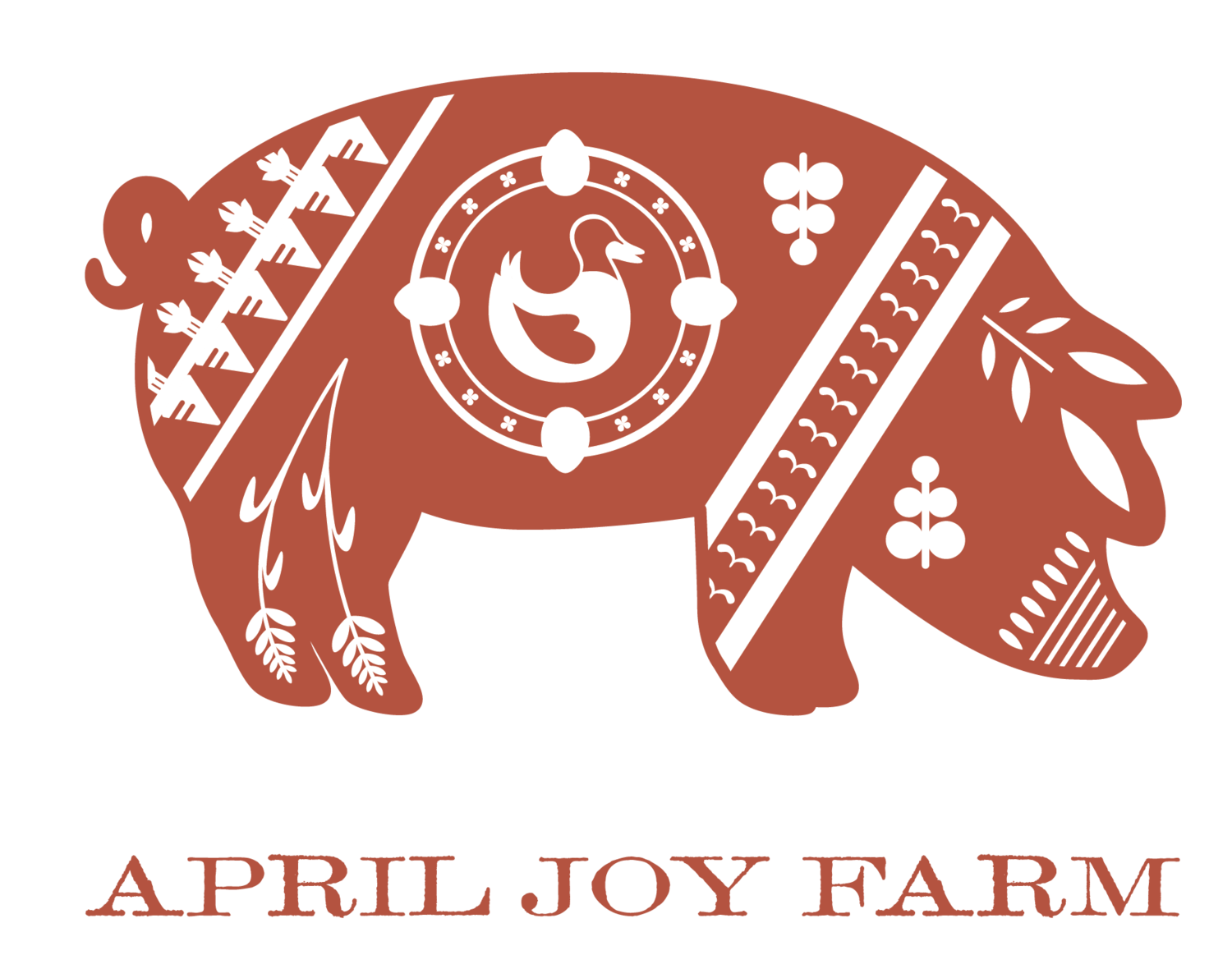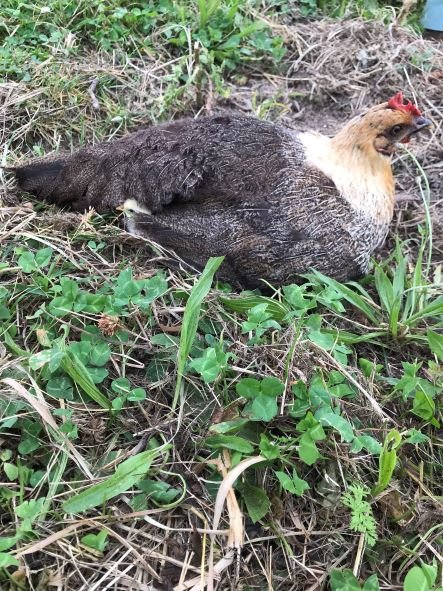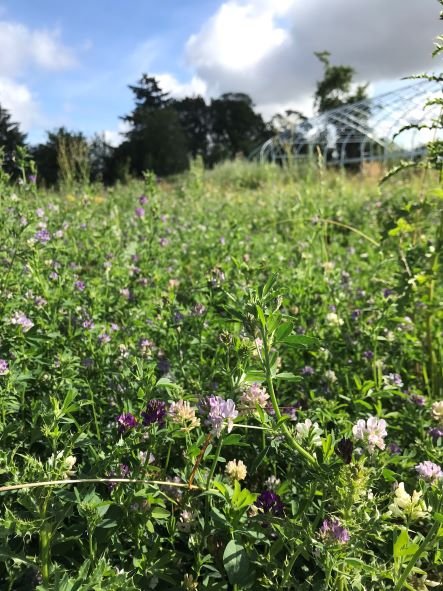Plurality
July 15, 2022
Summer’s Eve in the Hayfield | This year’s grass crop, awaiting the baler.
We’re in the swing of summer now, with hay cut and drying nicely in the summer sun. After a worrisome spring, Brad and I are quite relieved that for the most part, our crops are holding their own. The onion seedlings survived the multiple weeks of cold, dreary weather post-transplant, and we survived the multiple arduous weedings necessary to keep the grass from choking the plants out. Unlike most of our vegetables, grass loves 50 F and rainy, so in a wet cool spring, a race none of us farmers ever want to run begins the minute the first transplants are tucked in the ground.
Our potatoes also are up and growing well, with the first two varieties blooming this past week which typically signifies the onset of tuber formation. With so much moisture in the ground and that unusual spate of rain a few weeks back, we’ve not had to irrigate the rows at all.
The winter squash field is looking fine. Early on, the plants were beset by very hungry cucumber beetles. We don’t typically have concern over this because our soil is rich and our well-loved seedlings are strong. Combined with the long sunlight of June typically the plants grow so quickly the beetles can’t possibly keep up.
This year things were a little different– less heat and less ideal transplant conditions into cold soil meant it took a little more support from us to help those plants to find their bearings. We took extra precautions by adding compost to every planting hole and coating the leaves with kaolin clay which beetles don’t like the taste of. A thick layer of straw will help suppress weeds and provide shelter and moisture for wolf spiders and ground beetles, both of whom eat cucumber beetles.
Applied at the right time and in the right conditions, the mulch is a triple win- we don’t have to weed as much, or irrigate as much, and the mulch provides essential organic matter, which breaks down and feeds all those precious soil organisms that keep our system humming. A healthy, continuous supply of organic matter (leaves, plant debris, growing roots) is fuel for the whole system. Without organic matter, the soil starves, and that goes for plants and people too.
The tomatoes are still finding their stride. After a tough slog through an April snowfall followed by a long run of low temperatures and damp days, we weren’t sure the plants would even pull through. The win right now is that our plants are still alive and seem to be gaining ground thanks to this beautifully mild stretch of weather. Green tomatoes are peeking out from bushy plants here and there, so all we can do now is keep providing encouraging words and practicing patience. It’s shaping up to look like it will be a short season with few cherry tomatoes and a decent supply of plum and roma tomatoes, but I’m not a fortune teller and Nature is full of surprises so we’ll take what comes in stride and good humor.
Beans, summer squash, cucumbers, and tomatillos are also holding their own, thankfully. Summer herbs (basil, celery, dill) are also coming into their own. It was a happy moment to cook pasta primavera this week and dice up bright squash while smelling the aroma of basil. Ahhh and that first cucumber… delicious!
Sweet peppers, hot peppers and eggplant fall in the same category as tomatoes. It’s not shaping up to be a banner year. On all fronts, and with some farmer support, they have determinedly outgrown some serious aphid pressure, so we remain in awe of their tenacity. That said, jury’s out on when (if?) salsa season will come to fruition.
What I’ve come to terms with after all these years farming is this: Sometimes the harvest isn’t food. Sometimes what one gleans from the season is perspective, or lessons in perseverance, or a deepened institutional knowledge about the specifics of place and time. Sometimes the most one can hope for is straight up gratitude for the tenacity of life herself or for the human and non-human support systems that make what we do possible.
What’s the gratitude I’m feeling this year? Partners who help farmers thrive, like the Clark Conservation District, who several years ago made it possible for us to have the appropriate infrastructure to compost at scale. The volume and quality of compost we’ve been able to make since has been a saving grace - keeping nutrients cycling and reducing off farm expenses. Mentally, this is priceless.
Now, this may sound odd, but lately I’m also feeling a bit more appreciation for aphids, cucumber beetles and other typical critters that show up on vegetable farmers most-wanted list. Every year, I know, without any technical soil tests, that our soil is healthier because our plants are more resilient, and our harvests are exceptionally fine and tasty. We haven’t eliminated aphids or flea and cucumber beetles, but rather helped to orchestrate the rebalancing of the system. This makes me proud, because new research is uncovering the importance of agricultural pests to human health. As a Nature scientific report explains:
“It has been supported by several studies that organic fruit and vegetables contain higher levels of secondary metabolites related to plant defenses3,4,5. In general, vegetables and fruits from organic production contain greater amounts of anthocyanins, flavonoids and carotenoids5. Higher levels of phytochemicals, particularly phenolic compounds, could be related to higher levels of biotic stress, such as insect damage, when plants are grown in organic conditions6. Stresses like wounding and those induced by herbivores (biotic stress) cause changes in plant secondary metabolism.7”
Scientists hypothesize that when cucumber beetles eat holes in the leaves of squash for instance, the immune system of the squash kicks in a higher gear, producing compounds that spread through the leaves and into the fruit too. These phytochemicals- anthocyanins, flavonoids and carotenoids- are the very elements that contribute to human health.
When the system is in balance, insects get a meal and plants get stronger immune systems, which in turn, means more nutritious food for us humans too. Now that’s a beautiful system of reciprocity. Hydroponic, and chemically based agriculture systems aren’t just wastefully using up non-renewable resources and killing our soil, they are also depleting humans of vital nutrients. Plants, like people, need exposure to complex, dynamic, integrated systems to be hale and hearty.
So, there you go. One more lesson in humility, and in respecting the preciousness and intelligence of the greater natural system we are innately a part of. We need the plants, and we need the insects. And we need to be mindful of our interventions; the mindset of either/or is a human construct. Nature says: not duality, but plurality.
Hmm. Now I’ve got to dig deep and square myself with the intrinsic necessity of mosquitos. Which leads me to a perennial farming lesson. Some years, some rows are harder to hoe than others. ~AJ
New Peeps at the Farm | A day old chick peeks out from a cozy place. Tucked under mom are 6 more siblings.
Heaven Scent | Our first substantial crop of alfalfa is now in full bloom. Between the bustling insects visiting the flowers, the diversity of shades of purple, the deep taproots, the ability to fix nitrogen, and a sweet, sweet aroma- it’s impossible not to love this generous plant.
“And these words that you learn — like “magnificent” and “holy” and “sacred” — you see them. You see them in front of you. Things are very old and very beautiful.”



